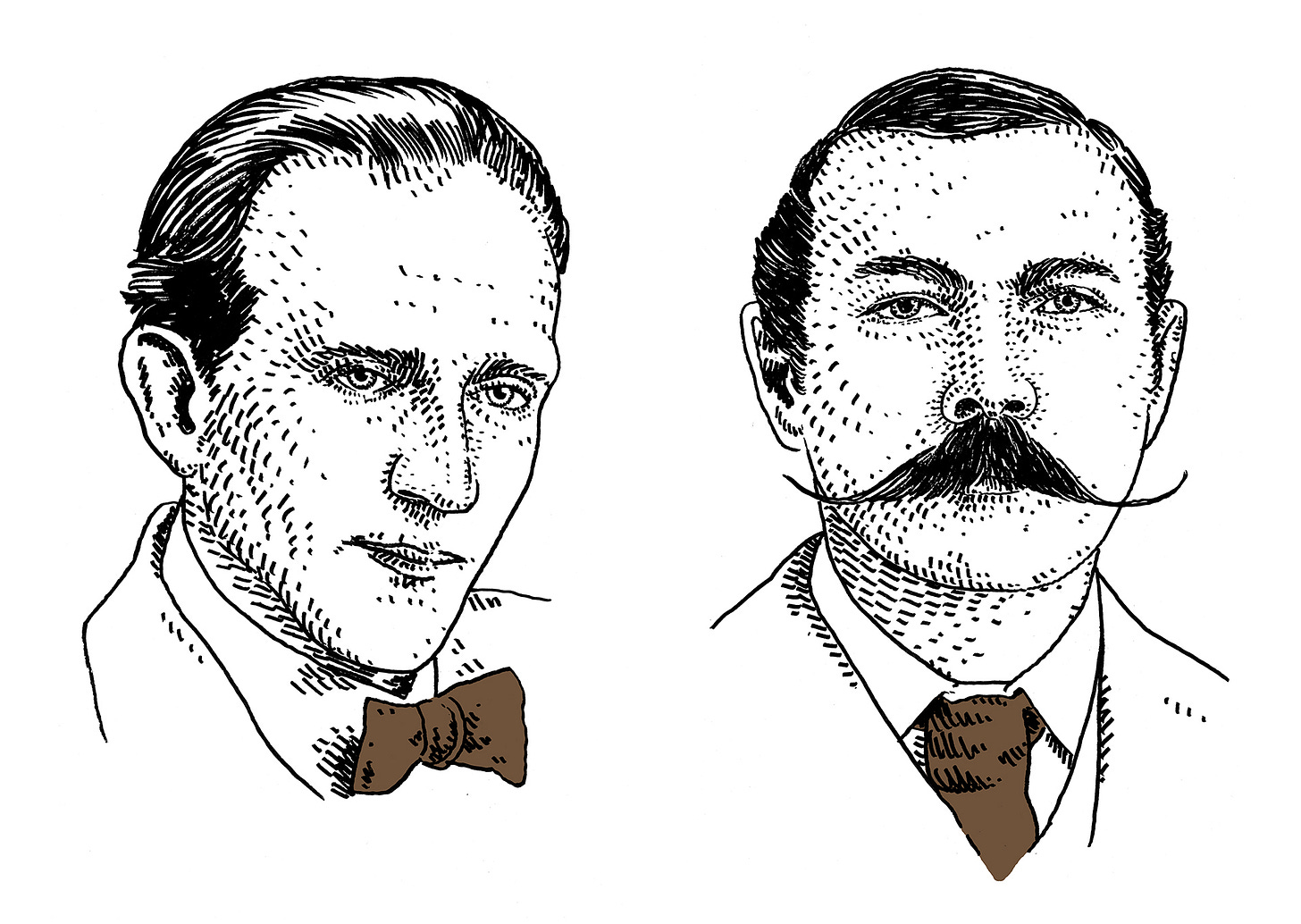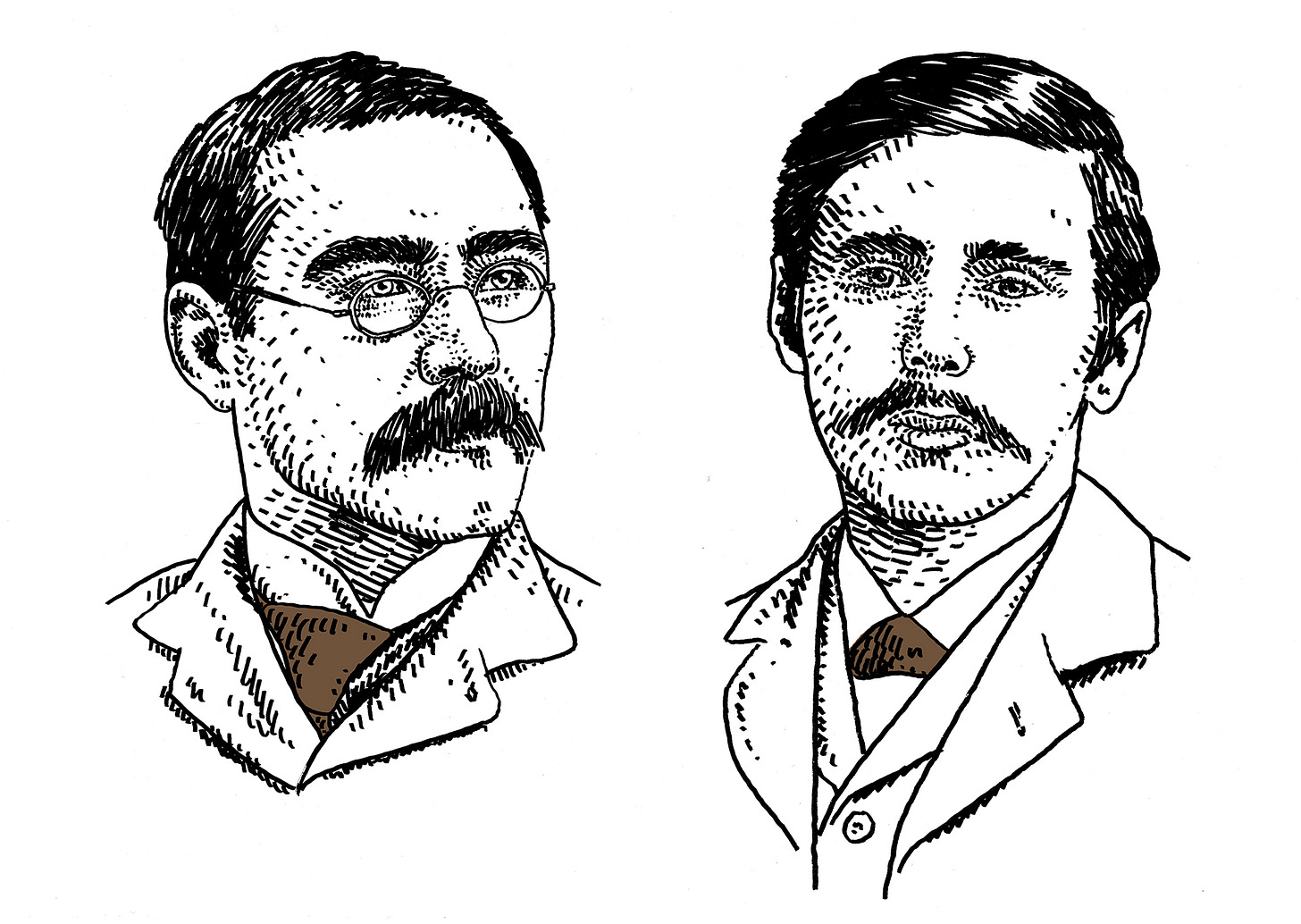The Worst Cricket Team Ever
The Allahakbarries were a team of beloved authors including J.M. Barrie, Arthur Conan Doyle, A.A. Milne, and Rudyard Kipling. They almost never won.
Welcome to Sports Stories, a publication at the intersection of sports and history. Sports Stories is written by Eric Nusbaum, illustrated by Adam Villacin, and delivered to your inbox every Tuesday.
If you’re not already a subscriber, please sign up here — we have both free and paid options. Paid subscribers are entitled to our eternal gratitude as well as cool swag including postcards featuring original art by Adam.
There are different ways to appreciate sports. This may seem like an obvious statement, but I think it’s worth repeating. So much of sports writing, and sports history, focuses on the .0001 percent of humans who become elite athletes and then find themselves in the right place at the right time so they might do something memorable.
As a society, we’re obsessed with the notion of glory. We turn sports into a morality play and turn sports into theater and turn sports into all these convenient things that are all wrapped up with winning and losing and the pursuit of excellence.
We’re guilty of this at Sports Stories too. We focus on people who rise to the occasion and do miraculous things and awe us with their talent. But greatness is not what makes sports great. The beauty of sports really lies in playing them. This is especially true when you are out there for pure enjoyment—not out of some obligation to exercise, or some misbegotten notion that you must become the best or else, or under external pressure to succeed.
Sports...they are supposed to be fun.
Then again, this is also a pretty frivolous idea for adults. Who among us has time to leave the world of work and chores and parenting and the endless litany of obligations that simply being alive demands behind to simply go and play? These days (pandemic notwithstanding) if we want to do something as luxurious as get in a pickup basketball game, we have to make the time. To carve it out. (I like the phrase “carve out the time” because it implies how painstaking this process actually is.)
But it wasn’t always this way. The roots of organized amateur sports in the United States and Europe unsurprisingly lie with people who had all the time in the world: the wealthy.
The upper classes of the 19th century didn’t have to bother much about labor or chores. So they played sports. Some folks took this very seriously (we published a story last year about the cheating epidemic in croquet in Victorian England), and others were more self-aware about the aforementioned frivolity of the whole endeavor. Which brings us to this week’s subject, a ridiculous cricket team composed of many of Britain’s most celebrated writers, artists, and eccentrics that was led by J.M. Barrie, the author of Peter Pan.
Barrie was a small and notably unathletic man from Scotland. He was left-handed and had a droopy mustache and was boundlessly enthusiastic. He adored the sport and had no fear of appearing ridiculous while playing. So what he did was recruit a team of fellow authors, artists, explorers and wealthy gadflies. Here’s what Barrie said about how he built his squad:
“With regard to the married men, it was because I liked their wives, with the regard to the single men, it was for the oddity of their personal appearance.”
The team began play in 1887 and quickly took up the name Allahakbarries. The name was meant to be a joke about how inept they were on the pitch. Barrie and his pals were under the mistaken belief that the Arabic phrase Allahu Akbar meant “Heaven help us.” Allahakbarries, then, was supposed to be a portmanteau combining “heaven help us” and Barrie’s last name. Allahu Akbar does not in fact mean “heaven help us.” It means “God is great.”
This misunderstanding was sort of fitting. It reflected the deep seated and casual ignorance of Britain in the age of Empire and also reflected the futility of the team itself. The Allahakbarries needed all the help that heaven could afford them. For almost 30 years, they gathered every summer to take on other teams of artists and writers as well as local clubs. They nearly always lost.
Barrie would encourage the team not to practice before games because the site of their pitiful skills in warmups might inspire confidence in their opponents. Over the decades, Barrie recruited many of Britain’s most iconic authors to join him, and kept detailed records and journals of their performances. In 1890, Barrie self-published a slim book to commemorate the team’s exploits. The book was re-published in wider circulation in 1950. Then in the early 2000s, a writer named Kevin Telfer accidentally discovered Barrie’s original collection of cricket-related papers. He used them to write a delightful little book called Peter Pan’s First XI.
The only good player on the team, it seems, was Arthur Conan Doyle, who according to legend named Sherlock Holmes after a pair of cricket players (their names were Sherwin and Shacklock). "Doyle. A grand bowler. Knows a batsman's weakness by the colour of the mud on his shoes,” wrote Barrie in his journals.
Conan Doyle was also the exception to Barrie’s rule that the more acclaimed the writer, the less successful he would be on the pitch. The others, including Rudyard Kipling, P.G. Wodehouse, H.G. Wells, A.A. Milne, G.K. Chesterton, and on and on— were all lousy. In his journals, Barrie reveled in this lousiness, including in his own. Barrie himself bowled so slowly that “if he didn't like the look of a ball he could go and fetch it before it reached the other batsman & bowl it again.”
The accomplishment of this squad was not their performance on the field, but the fact that Barrie was able to get his friends to drop any inhibitions they might have had about looking ridiculous. Apparently for a bunch of guys who wrote about detectives and stuffed animals and time machines and the glory of colonialism and snarky butlers, they could be a pretty serious lot. The accomplishment was that by playing cricket, the Allahakbarries—these men whose works had given millions of people the chance to suspend disbelief and escape into another reality—were themselves able to escape.
After all, sports are supposed to be fun.
Sports Stories is an independent publication, and our best chance at growing is by word of mouth. If you have dug this or any issue of Sports Stories, please do us the solid of sharing it with a person you think might dig it too.
Thanks for reading. We’ll see you next week.







This entire article filled me with joy and maybe tea and crumpets